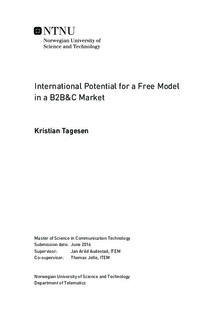International Potential for a Free Model in a B2B&C Market
Master thesis
Permanent lenke
http://hdl.handle.net/11250/2412604Utgivelsesdato
2016Metadata
Vis full innførselSamlinger
Sammendrag
Several establishments worldwide are growing in size and see frequent
internal changes in buildings, which presents a demand to manage and
accommodate these changes in order to maintain a satisfied customer base.
One way to offset the inconveniences that this may cause, is through an
indoor mapping service. Providing an up-to-date, interactive and digital
indoor mapping service may offer benefits to establishments and its clients
alike. MazeMap is a company specialising in providing indoor mapping
services to a wide selection of customers ranging from universities and
hospitals, to sporting arenas and cruise ships. With the software as a
service style of product delivery becoming a delivery method of choice
among a large portion of software development companies, new business
models has emerged as a result. One such model is the so-called freemium
model, thoroughly tested in the consumer market but not in the business
and enterprise market.
This thesis aims to propose a freemium-based business model for
companies such as MazeMap, who are willing to try new business models
in B2B and B2B&C markets. In order to propose such a business
model, an international survey has been conducted, and companies that
successfully employs the freemium business model in business-oriented
markets, has been investigated. The survey targeted higher education
institutions, receiving 39 responses from responders worldwide with 14
different countries being represented. In the results, 64.1% expressed an
initial interest in an indoor mapping service, which subsequently increased
to 84.6% after the potential benefits of such a service was been stated. In
the paradigm of freemium, the fact that the few pays for the many is a
central theme. In relation to this, the survey measured the respondents
willingness to pay for premium features, with the results being in line
with the expectation that few would indicate a strong willingness to pay
for these features.
Based upon the success factors of the companies that successfully
employs the freemium business model along with the survey results, a
business model was proposed. This model was built in the framework
that is the Business Model Canvas, and provides both a textual and
visual representation of the presented business model.
